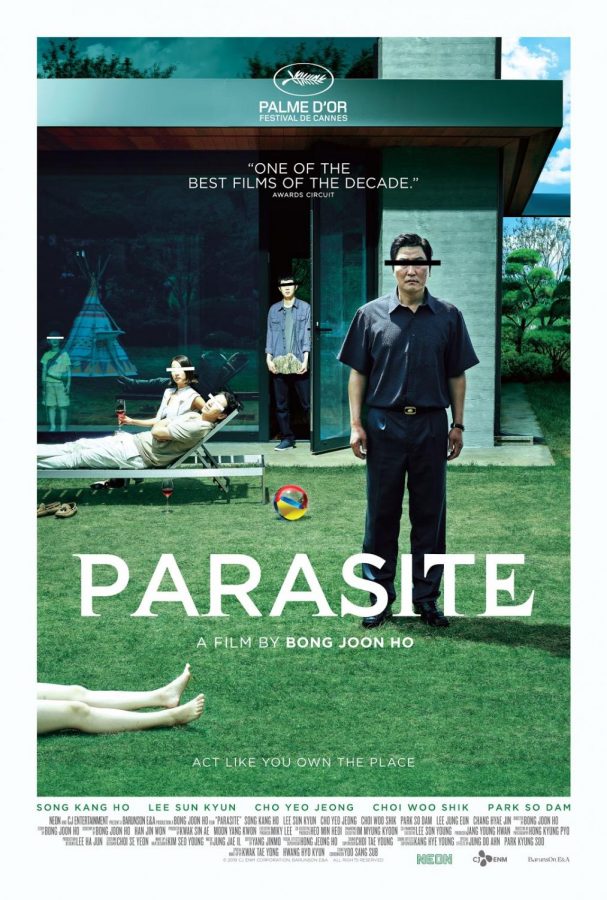Parasite: A Class-Conscious Masterpiece
Parasite is an extremely unique experience with the beginning of the movie carrying a relatively funny, lighthearted tone, but as the movie progresses, you start to get stressed. The movie is very good at making you feel like everything will go wrong. The feeling starts with the worry that their plan will go wrong and they’ll be caught. However, later in the movie, your stress becomes more based around the more disturbing events that begin to unfold.
I definitely wouldn’t recommend this movie to people who respond poorly to high amounts of stress. The movie perfectly portrays the feeling of everything in your life falling apart.
(Spoilers!)
The movie is initially a relatively funny story of a poor family tricking a rich family into firing all of their domestic employees and hiring them. Although their poor financial situation is certainly uncomfortable, the general tone is very light hearted. However, the whole time you feel on edge, you are waiting for the point where the fail.
Eventually they find someone living in the families basement who wound up being the husband of the woman the family fired. From that point, the story has an extremely tense tone that ends with the rich family being murdered and the poor father being locked in the basement. It ends on an oddly highnote with the son planning to buy the house and free his father. We are not sure how to feel about the ending as it was a large shift from the tone of the movie just scenes before.
It’s pretty clear by just looking at this short synopsis of the plot that economic class is a major theme in Parasite. The reality of the struggles of poorer working-class people is constantly shown through the eyes of the Kim family. They are constantly worried about their monetary situation and are vigorously searching for a job that will be able to pay their bills and pay for their basic needs. The Park family counteracts the Kim family perfectly, their overwhelming wealth is almost comical when compared to the reality of the Kim family.
But Parasite doesn’t simply notice that class exists, it tells a story that provides a complex and thorough discussion of several different issues that are directly connected to the nature of class in a capitalist society. Parasite handles this discussion in two main ways: recurring imagery shown throughout the movie and the thematic significance of the plot.
I would like to start by discussing some of the recurring imagery shown in the movie. One of the major ideas of Parasite is the film’s use of the concept of cleanliness. The Park’s house is big and clean with a nice modernist architect which involves a lot of unstained white walls. On the other hand, the Kim family lives in sub-basement, a type of cheap underground apartments popular in South Korea that are usually made from abandoned bomb shelters in apartment complexes, that has dirty and dank floors and walls. But the strongest example of the idea of cleanliness in the movie would be the smell of the Kim family.
This idea of smell first enters the movie when the Park family’s youngest child, Da-Song, smells the members of the Kim family after they all get jobs at the Park’s house and states that they all smell the same. The scene after this shows the Kim family at home joking about needing to use different shampoos in order to hide their identity. At first, this scene may just seem like a way to increase the tension over whether the Kim family will be caught it is actually an introduction to this idea of smell which is built on in a later scene in the movie.
This later scene happens while the son, daughter, and father of the Kim family are hiding under a table after they spent a night over in the Park house while the Park family was out on a trip. The Park father (Park Dong-ik) and mother (Park Yeon-kyo) are laying together on a sofa next to this table when Dong-ik brings up how despite how much he enjoys Ki-taek as a worker, he does smell weird. He then mentions that this smell is the same one he smells whenever he rides the subway and it becomes clear that this smell isn’t simply supposed to be something that gives the Kim family away but something bigger. The idea of not fitting in is a prevalent concern for many minority groups when they enter spaces that they don’t believe they belong in. The working class is no exception to this as it can feel that no matter how you dress or how you act, some uncontrollable part of you will give away that you are working class which is reflected in Parasite by the smell. No matter how well the Kim family disguises themselves as much better off than they actually are to the Park family they are still working-class and it can feel as if they aren’t able to ever escape the label.
Another idea that the movie brings up within its plot is the competition that capitalism creates between members of the working class. In order to live comfortably in a capitalist world, you must have money in order to survive. You need money to buy food, to afford to live somewhere, to pay taxes and bills, to pay for healthcare in case you get hurt, and to buy materialist wants that make you happy. This creates an intense desire for anyone who lives in a capitalist society to make money in any way possible in order to pay for these basic needs and materialistic wants. This creates a philosophy among many working-class people that they must put their profit interest over other people’s wellbeings. This is why many people turn to crimes like dealing drugs or robbery, which has a high chance of endangering themselves and others, in order to quickly make a lot of money. And it is also why the family in Parasite works so hard to get the other workers fired in order to ensure their own economic success. While the highly dramatized Ocean’s Eleven type plans the Kim family makes in order to fire all of those workers is rather unrealistic it does serve as a good representation of the issue by being a clear exaggerated version of it. The Kim family doesn’t do what they do because they have some personal vendetta against those workers but because the society they live in encourages and for the case of the poor Kim family often requires that behavior in order to successfully survive







